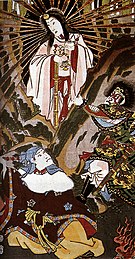Japanese mythology - Simple English Wikipedia, the free encyclopedia
Japanese mythology is a system of beliefs that includes Shinto and Buddhist traditions. The Shinto religion alone has many kami (Japanese for "gods" or "spirits").
Most Japanese myths, as generally known today, are based on the Kojiki, Nihonshoki and some other books. The Kojiki or "Record of Ancient Things" is the oldest known book of myths, legends, and history of Japan. The Shintoshu explains origins of Japanese gods and goddesses from a Buddhist point of view while the Hotsuma Tsutae has a very different version of mythology.
One notable thing of Japanese mythology is that it explains birth of Amaterasu, the origin of the Imperial family, and assigned them divinity. The Japanese word for the Emperor of Japan, tennō (天皇), means "heavenly emperor".
Related pages
[change | change source] | |
| Mythic Texts and Folktales: |


 French
French Deutsch
Deutsch